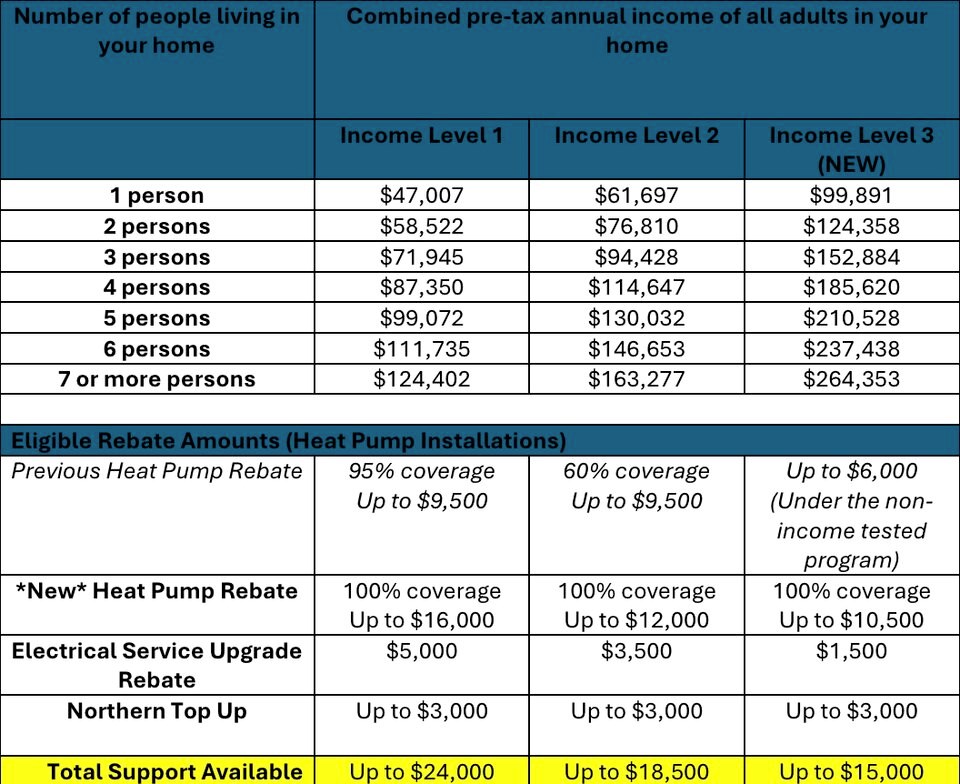Federal and provincial politicians gathered in Victoria on Monday to announce a combined $254 million to help B.C. residents switch to more-energy-efficient home heating and cooling options, such as heat pumps.
A joint statement from Environment Canada and B.C.’s Energy Ministry said Ottawa is providing up to $103.7 million while the province is adding up to $151 million to increase the number of households eligible for upgrades.
It represents a 70 per cent increase in green-energy rebates and expands the program to middle-income households who want to replace their gas or oil furnace with a heat pump.
Qualifying British Columbians could “essentially get a free heat pump through this program,” said Minister of Energy, Mines and Low Carbon Innovation Josie Osbourne. “And then you also get the health benefits of a new cooling system in your home.”
Osbourne said the money will increase the maximum rebate amount for a new heat pump to $16,000, up from $9,500.
Those living in northern B.C. will be eligible for another $3,000 top-up to account for the additional cost of cold-weather heat pump technology. Osbourne said successful applicants may receive up to $5,000 for electrical service upgrades to install and run a heat pump.
A low-income family in 100 Mile House wanting to transition from heating oil to a heat pump could receive a total of $24,000, said Osbourne. A renter in Victoria looking to replace an old natural gas furnace, meanwhile, could receive up to $12,000.
For a home to be eligible, it must be a year-round primary residence and at least one year old, Tania Venn, a spokesperson for the Ministry of Energy, Mines and Low Carbon Innovation, said in an email.
The property must have an assessed value of no more than $1.23 million to meet the first two levels of income qualification. There is no property value cap for middle-income applicants, said Venn.
Homeowners or residents must have utility accounts in their own name. Primary heating for the home must include natural gas, propane, oil, electricity, wood or other solid fuels.
Eligible home types include single-family houses; a secondary suite with its own utility meter; a mobile home fixed to a foundation and connected to services; and a duplex, triplex, row home, or townhome in which every unit is hooked up to its own natural gas and/or electricity meter.
Renters are eligible but must have a landlord consent form to accompany their application.
Applicants can pre-register starting in June to see if their income and home are eligible for the program. If successful, the rebate will directly apply to the cost of the upgrade, leaving households to pay for what’s left at the end.
Successful applicants who switch from heating their home with oil to a heat pump will get a one-time $250 payment from the federal government.
In a statement, the B.C. government said the program would create 9,000 jobs and eliminate 40,000 tonnes of carbon equivalent emissions by 2030 — roughly equal to removing about 12,000 passenger motor vehicles from the road.
The CleanBC Better Homes Energy Savings Program also provides funding for home upgrades, such as the installation of energy-efficient windows and doors, insulation and ventilation.
B.C. Minister of Environment and Climate Change Strategy George Heyman said switching to clean heating sources, adding insulation, and installing better windows and doors will “save hundreds if not thousands of dollars.”
“It will make their homes more comfortable. It will enable them to withstand heat waves, as well as cold winters,” he said.
Steven Guilbeault, federal minister of Environment and Climate Change Canada, said the program comes as many Canadians are kept awake at night by both the cost of living and climate change.
Several thousand people are under evacuation orders in the Fort Nelson area after strong westerly winds pushed the Parker Lake wildfire toward the community amid a multi-season drought.
“My heart goes out to the people of Fort Nelson, and other Canadians who are currently being evacuated because of forest fires,” said Guilbeault.
As the politicians stepped up to the mic, federal Minister of Energy and Natural Resources Jonathan Wilkinson said of the roughly 120 wildfires burning across Canada, about 50 were in B.C.
“We have been working around the clock to prepare for the worst,” said Wilkinson.
For more information, go to betterhomesbc.ca.

>>> To comment on this article, write a letter to the editor: [email protected]



